
The educational institution in which I studied for two years
Hi, Habr. This is the second article in the "Spanish cycle". In the first part, the author talked about moving to Spain. The topic of the second part is training and vocational education in this country.
I have always liked to study. When we decided to move to Spain, I was interested in the opportunity to leave on a study visa. Under the cut is a story about how I studied to be a marketer in Spain (digital marketing) and what I remember most of all.
Why Marketing?
In my home country, I received a higher education in economics, I had a lot of experience in copywriting and a little in SMM. Therefore, training to become a digital marketer seemed to me a logical step. In addition, I wanted to completely immerse myself in the Spanish-speaking environment, not at the everyday, but at the professional level. These are no longer Spanish courses or conversations about the weather and nature. More and more complex and interesting.
Educational institution
At first, I planned to enter a master's program at a major university, applied and even entered. But the circumstances changed, and I realized that I could not spend all the time studying. In the magistracy, I would have to sit for days at books and notebooks. This I could not afford because of two children. So I decided to simplify the task and went to the Centro de Formación Profesional .
Centro de Formación Profesional (CFP) is an institution for secondary and higher vocational education in Spain. I don’t think I’ll be wrong if I compare it to our technical schools or colleges in America. But if our schools are not considered the most prestigious places to continue their studies, then in Spain this is a completely normal story. Most Spaniards deliberately do not go to universities, but go to CFP, because:
- it's cheaper;
- you need to study only 2 years;
- it is not scary if it turns out that the chosen profession does not like it;
- by the age of 20, you already have a specialty in which you can go to work;
- after CFP, you can enter the university without exams, only by passing score;
- less responsibility in general, which is very close to the Spaniards.
We studied according to the evening schedule from 15:00 to 21:00, and we were informed about this mode the day before classes. As a mother of two small children at that time, I fell into a stupor, as I counted on the usual mode of education from 9:00 to 15:00. I had to reshape my personal schedule as soon as possible. Over the next two years, I saw my family mostly on weekends.
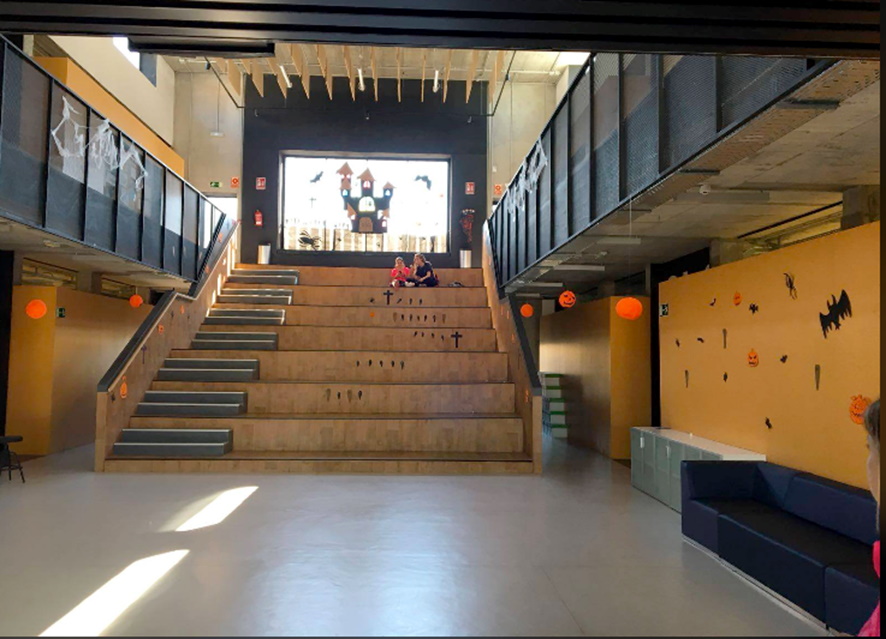
CFP Hall Prepared for Halloween
Cost of education
CFE Reina Isabel is a private institution, so all students pay for the course, there are no scholarships or free tuition in the first year. For two years, I spent about 5 thousand euros on my studies. Conveniently, you can pay monthly, money is automatically debited from your bank account. It was psychologically easier to pay 200-250 euros a month than 2500 euros at a time.
By the second year of study, all of my classmates sharply intensified in their studies. The thing is that with good grades it was possible to apply for "beca" - partial or full compensation for the cost of training. Since I was an international student, I was not entitled to any financial aid or scholarships, so I was not particularly interested in the details. I only know that beca is different and many factors affect its receipt, for example, the financial situation of the family, the presence of brothers / sisters, children, and so on.
Program and educational process
In the first and second years of study, subjects were different, including the duration. For example, we learned English for two years, and neuromarketing only for two terms. Main subjects:
- management of the company's economic and financial resources;
- marketing strategies;
- commercial research;
- ;
- , ;
- ;
- ;
- ;
- digital-;
- ;
- PR ;
- .
We also took courses in Adobe Photoshop and Adobe Illustrator, a lot of attention was paid to the development of imagination and creativity, market research and companies, in particular. We played games like crocodile, competed to create the most creative table design and generally lived in a competitive spirit, in a good way.
In all subjects there was theory and practice. About a third of the course was devoted to theory. I never had any problems memorizing the material. It was difficult because of the Spanish language, but I did it. I also noticed some unevenness in the training load. For example, we were given very basic topics in economics. For example, one formula could be studied for three months. But then in two weeks an information avalanche fell on us.
All the teachers were not theoreticians, but working specialists in private companies: marketers, accountants, financiers, designers, etc. Therefore, our practice was at a high level, and there was no shortage of fresh cases. For example, the owner of a winery came to us and talked about how they build their work and how they live. And we had to create a new working business plan for him, identify the main mistakes, work out the digital direction of the company's development and even create a layout of an attractive website in Photoshop.
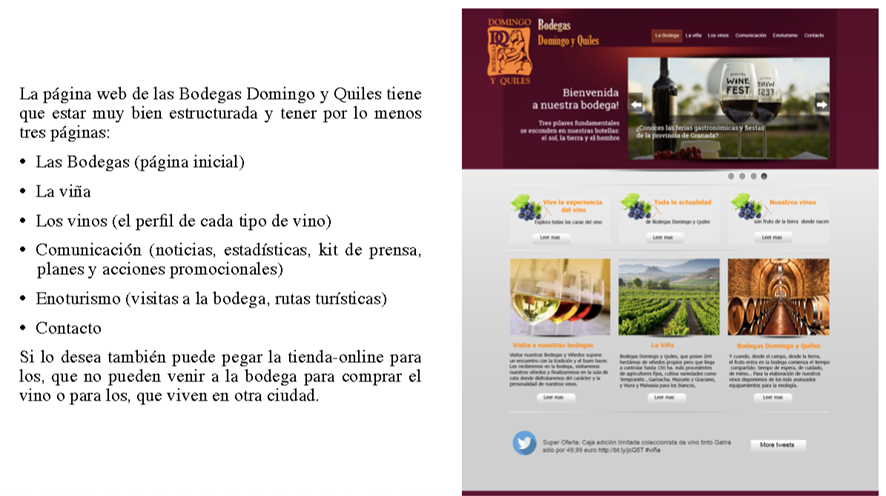
Screenshot from my presentation on the Bodega project with a layout created in Photoshop
There were a lot of homework assignments: cramming, tasks, analysis, creative projects, etc. Most often they worked in groups of 4-7 people. For me, accustomed to the individual performance of all tasks at the institute, this was a novelty. Then it became very annoying: there were often situations when one person let down, and the assessment was lowered for the whole group. Add to this the madness in chats on a particular project, the inability to negotiate, the unwillingness to work efficiently and the lack of "colleagues" at night online (the only time when I could do my homework). On the other hand, group work is a good way to learn how to join the team, find a common language with each of the companions, and the feeling of pride in a job well done is always felt stronger in the team.
Almost every collective work ended with a presentation, a performance in front of the group. For me, public speaking is just torture, although in the end I adapted. Usually each of the team takes on some part of the project and talks about it.
By the way, the Spaniards make presentations always and everywhere - from elementary school to universities. For example, starting from the first grade of school, my daughter performed tasks as a team, after which the groups mixed and worked in a new composition.
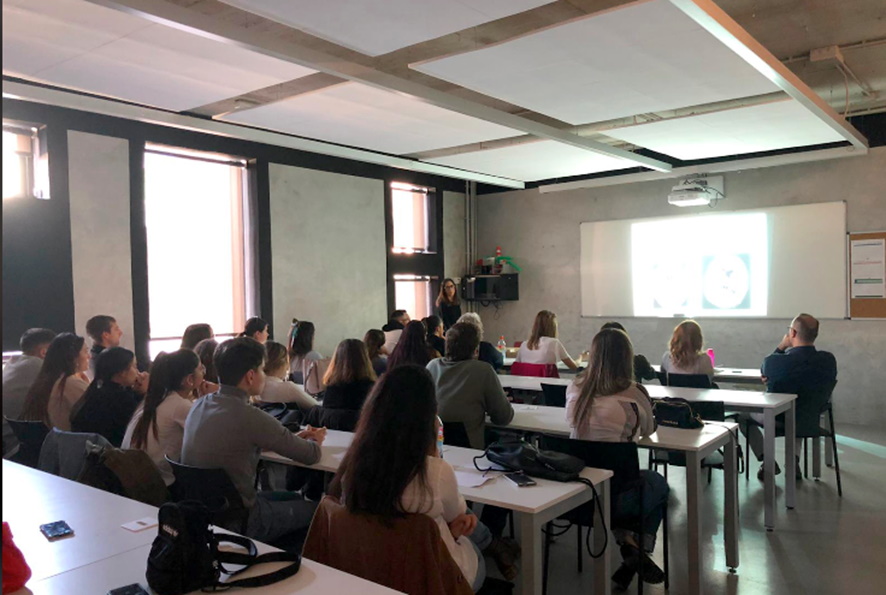
Presentation in full swing
My teachers tested knowledge in a variety of ways, from tests to written exams. Only projects in the form of the already mentioned presentations were submitted orally. There are practically no problems with tests, it is enough to read the book once to remember the nuances. In accounting and economic analysis it was more difficult - tasks, balances and formulas were not easy for almost everyone. The market research instructor loved to ask the study of a lengthy book two days before the exam, so that then he could do a powerful slice of knowledge in a written format.
Knowledge assessment and retake system
Spain uses a 10-point grading system. If my memory serves me, in order to pass the subject, you need to get at least 4 points. All laggards go to retake. Most teachers rounded off the score, but some preferred to give fractional grades, for example, 7.6.
I don’t know how things are at universities, but no one was expelled at my school. If a student could not pass the exam two or three times, he received the opportunity to pass everything in the next trimester or even the next year. As a result, everyone was present at the release, even those who had not learned the definition of the word "marketing" in two years. Most likely, at the university everything is much stricter with this.
Practice and thesis
The last trimester of the second year of study was devoted to the practice and writing of the final work. The practice took place in companies with which the training center has entered into an agreement. This format of cooperation is beneficial for everyone. Thus, companies receive tax incentives by accepting students, and students receive practical experience.
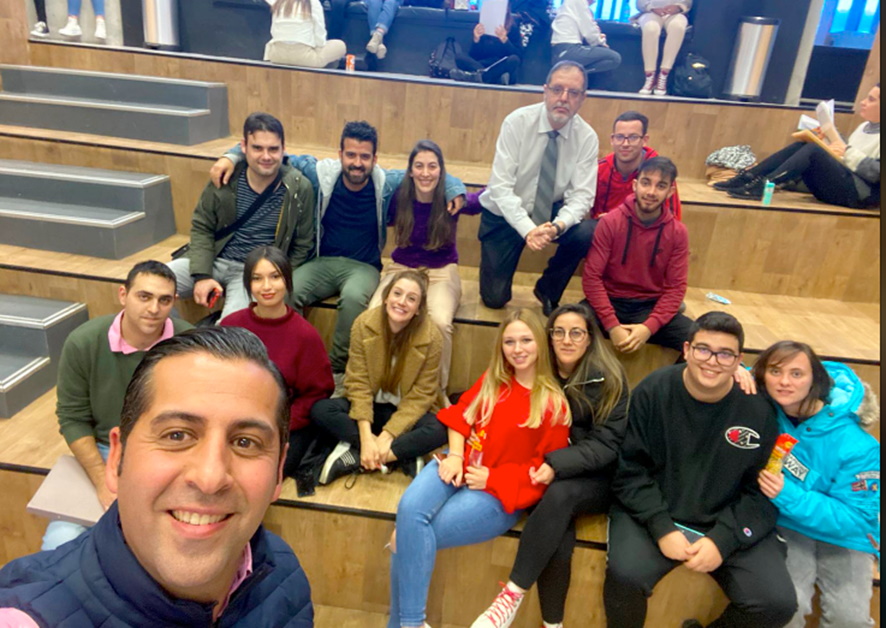
Students communicate with teachers on an equal footing.
For practice, we had to go 20 hours a week or every day for half a day, recording in a special diary. It was possible to negotiate with the management and walk, for example, 2.5 full days, but this is in an unofficial format. At the same time, we wrote our thesis. It was necessary to develop a project, a startup or an enterprise from scratch - from the name to the calculation of the financial balance. Two or three times a curator unexpectedly came to my practice to check my presence in the office, as well as to see what tasks they gave me and how the writing of the diploma was progressing.
The assignment for the thesis was voluminous, we were given a list of key points (several dozen) for which we had to write a project. I described about 90% of everything that was indicated in the assignment, that is, I took into account almost all the points. I chose the creation of a café-library in Granada as my theme and calculated almost all the little things - from the cost of chairs in the halls to the annual report on financial results. Later it turned out that out of 30 points of the assignment, it was possible to choose about seven, which was done by my classmates. The work of my colleagues took from 15 to 40 pages, and my 120-page diploma looked curious against the background of other projects.
About teachers and classmates
Some of the teachers were my age or a little younger than me (at the time of my studies I was 31-32 years old), several more teachers were over 50 years old. There were no problems with the teachers, it was difficult to work with only one. He was 60 years old and had an odd sense of humor. He constantly addressed me as the only foreigner in the group. But there was nothing good about it. For example, he could ask in front of everyone: "How do they choose shower gel in Ukraine?" Once he said: "You look neat, even though you are Ukrainian." I tried to ignore his phrases, but sometimes it was unpleasant.
Another teacher, an imposing man of about 50 years old, dressed like a model from the cover of a glossy magazine. But I no longer remember him for this, but for his negative attitude towards “Estranjeros”, foreigners. He treated me politely and tried not to notice, but twice he could not hide his surprise. The first time, when I quickly put three-digit numbers at the blackboard in my head (his surprise is understandable, not all Spanish students knew what a simple percentage is, let alone count it in my head), the second time when I prepared well report and made a successful presentation, despite her imperfect command of the Spanish language. I hope I was able to change his attitude towards other nations.
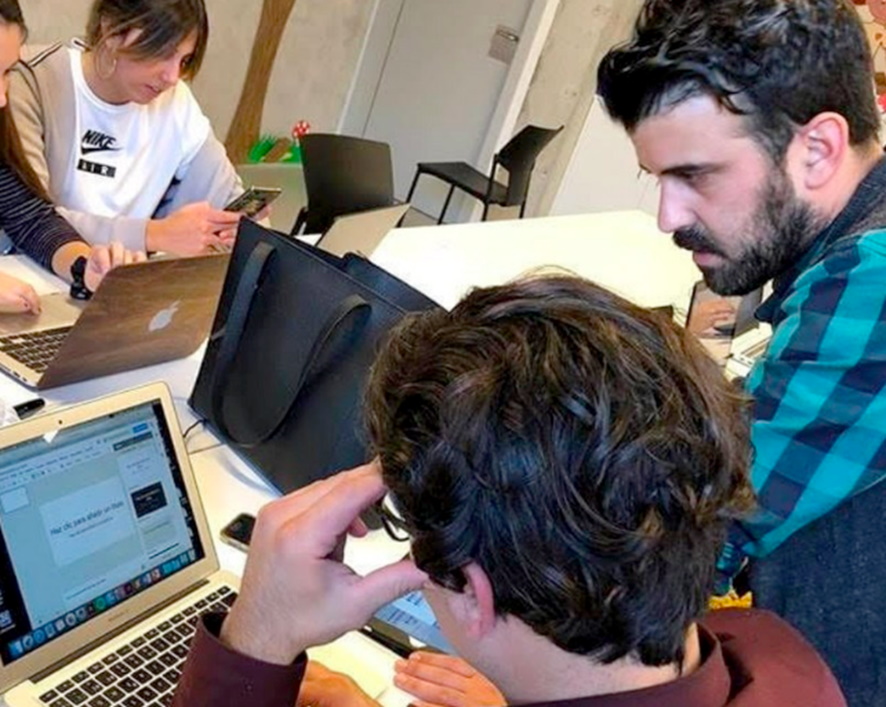
Most of the students work on their laptops, but there are also classes equipped with technology for those who do not have their own laptop.
I didn’t have any strong friendships with my fellow students for several reasons. I was a black sheep because of my accent, age and two kids. Apart from studying, there were no common interests with them, although we communicated in a friendly manner. Overall, the atmosphere was welcoming.
As for the composition of the group, everything here is just like ours. There are nerds, there are hooligans. There were always a couple of poor students and avid truants, plus a couple of excellent students. The majority of students are average with grades from 5 to 7 points. Despite the cheerfulness and light-heartedness of most of the Spaniards, they were worried about grades and studies. Many are nervous before presentations, there were also tears - for example, girls were upset to tears because of triplets. Before the exams, everyone had to prepare hard for at least one night, even if up to that moment they had spent a minimum of time studying.
Outcome
My study in Spain is an unforgettable, interesting and sometimes challenging experience. I continue to work remotely using the acquired knowledge and experience. I went to interviews a couple of times, more for the sake of interest than the desire to get a job in the office. The problem here (I live in Granada) is that there is a very high unemployment rate in this region and there are not very many companies whose leaders use modern methods of development. For many entrepreneurs, handing out flyers is still the highest level of promotion they can do. Now I am planning to move to Valencia or Madrid, where the chance of getting an office job is much higher. However, I am not sure that after the removal I will like the "stationary" work.
